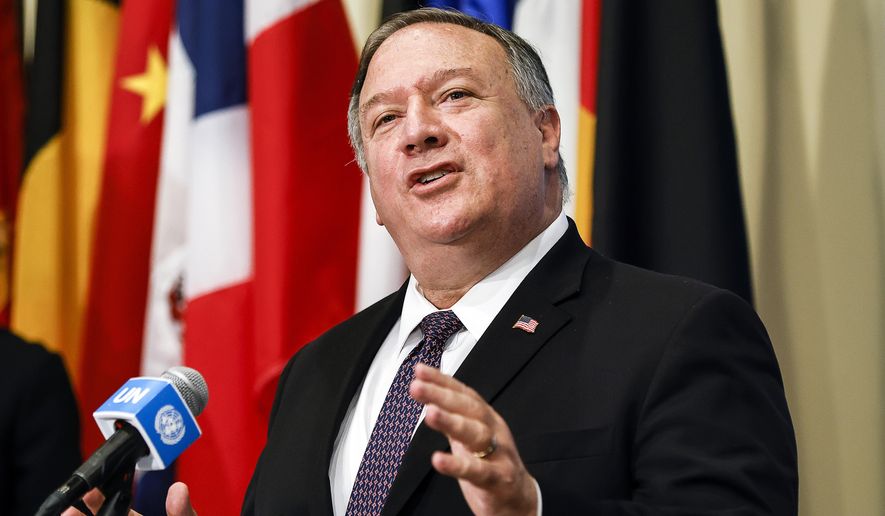China’s announcement Saturday that it may block the export of key technology has thrown into question the proposed forced sale of the popular video app TikTok to an American company, Secretary of State Mike Pompeo said Monday.
Concerned that China will obtain vast amounts of personal data on Americans from sites such as TikTok, the Trump administration has called for a ban on their use, as have at least two other foreign governments, Mr. Pompeo said in an interview with WMAL.
The administration announced earlier this month that it will ban TikTok and the Chinese messaging app WeChat over concerns China will use them for spying. Australia and India already have banned the apps.
Over the weekend, the Chinese government imposed new licensing requirements on the export of artificial intelligence technology, a move that led Beijing-based ByteDance, owner of TikTok, to slow down negotiations with three American bidders to sell its U.S.-based business as part of efforts to avoid the ban.
Analysts said Chinese officials may be trying to scuttle a forced sale, drive up the price of buying TikTok or force the U.S. government to issue a blanket ban on an app popular with many young people. Microsoft and Walmart are among those who have discussed a deal.
TikTok has repeatedly denied links to China’s military or intelligence services, and has sued the Trump administration to try to stop the U.S. divestiture.
Asked if TikTok will be banned, Mr. Pompeo said he does not know how the issue will unfold.
“What we know is this: We will ban the Chinese Communist Party from stealing the information — your information, my information, your kids’ information, whoever is using TikTok,” he said.
President Trump’s executive order banning TikTok, the most popular app ever developed by a Chinese company, and WeChat, a messaging and mobile payment site widely used inside China, which goes into effect next month, “is a central part of that,” Mr. Pompeo said.
On reports that China is moving closer to Iran, Mr. Pompeo said: “It probably should come as no surprise to anyone that two of the world’s greatest violators of basic human rights might find common cause.”
The administration is closely watching China-Iran relations over concerns Beijing wants to sell weapons to Iran under the terms of the 2015 nuclear deal that the United States is opposing.
“They’ll make a lot of money off of it,” Mr. Pompeo said of Chinese weapons transfers to Iran.
Additionally, China likely will purchase some weapons from Iran when the ban on arms sales to Tehran ends in October.
“We’ve got to prevent this from happening, and the world should know that should China choose to violate the sanctions that we have imposed against Iran, that we’ll hold everyone accountable,” he said.
On the recent arrest of a Chinese national researcher at the University of Virginia on trade secrets theft charges, Mr. Pompeo said the administration is working hard to prevent Beijing from stealing U.S. know-how.
“I regret only that for decades we’ve allowed this to go on,” he said.
The Trump administration has cracked down on China’s theft of American technology, which an FBI report estimated cost between $250 billion and $600 billion annually in lost technology and intellectual property.
“We know this: We know that the Chinese Communist Party has stolen hundreds of billions of dollars of intellectual property, and with that tens and hundreds of thousands of American jobs,” Mr. Pompeo said.
China is using a program called the “Thousand Talents” to recruit U.S. experts and has infiltrated agents into the U.S. university system, U.S. officials say.
“You saw the decision that the State Department made to demand that the Chinese consulate, their diplomatic facility in Houston, Texas which was a den of spies, be closed,” Mr. Pompeo said. “We sent them home.”
U.S. officials say that Chinese government targeting of American research institutes has involved stealing data, using it to develop goods and then sell them to the United States.
“We’ve got a full-on campaign, a counterintelligence campaign, an FBI effort, a Justice Department effort, and then the work that we will do diplomatically and economically,” Mr. Pompeo said.
Mr. Pompeo said not all of the estimated 300,000 Chinese students studying in the U.S. are spies but many can be coerced into working for the government.
“You wouldn’t consider them spies in the most formal sense but many of these students are under enormous pressure as a result of the activity that the Chinese Communist Party is taking back home,” he said.
• Bill Gertz can be reached at bgertz@washingtontimes.com.




Please read our comment policy before commenting.